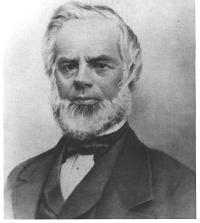 Although there are many opinions on who the actual founder of New Thought is, since the essence of the movement is rooted in the interpretation of Quimby's teachings, Quimby should be credited as the overall intellectual father of New Thought.
Although there are many opinions on who the actual founder of New Thought is, since the essence of the movement is rooted in the interpretation of Quimby's teachings, Quimby should be credited as the overall intellectual father of New Thought.MY THEORY: the trouble is in the mind, for the body is only the house for the mind to dwell in . . . If your mind has been deceived by some invisible enemy into a belief, you have put it into the form of a disease, with or without your knowledge. By my theory or truth I come in contact with your enemy and restore you to health and happiness.
-- volume 3, page 208 of Quimby's Complete Writings
Horatio W. Dresser, son of Annetta Julius Dresser, explained Quimby's ideas in a seven element list.
1. The omnipresent Wisdom, the warm, loving Father of us all, Creator of all the universe, whose works are good, whose substance is an invisible reality.
2. The real man, whose life is eternal in the invisible kingdom of God, whose senses are spiritual and function independently of matter.
3. The visible world, which Dr. Quimby once characterized as "the shadow of Wisdom's amusements"; that is, nature is only the outward projection or manifestation of an inward activity far more real and enduring.
4. Spiritual matter, or fine interpenetrating substance, directly responsive to thought and subconsciously embodying in the flesh the fears, beliefs, hopes, errors, and joys of the mind.
5. Disease is due to false reasoning in regard to sensations, which man unwittingly develops by impress-ing wrong thoughts and mental pictures upon the subconscious spiritual matter.
6. As disease is due to false reasoning, so health is due to knowledge of the truth. To remove disease permanently, it is necessary to know the cause, the error which led to it. "The explanation is the cure."
7. To know the truth about life is therefore the sovereign remedy for all ills. This truth Jesus came to declare. Jesus knew how he cured and Dr. Quimby, without taking any credit to himself as a discoverer, believed that he understood and practiced the same great truth or science.
No comments:
Post a Comment